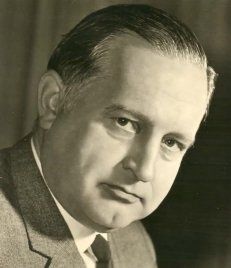Norbert Schultze
Norbert Schultze was born on 26 January 1911 in Brunswick (Germany). He was born into a bourgeois family, his father was a professor in medicine. Norbert Schultze learned to play the piano and violin during his childhood and decided to study music after completing his school. He moved to Cologne and studied under Philipp Jarnach (composition) and Hermann Abendroth (conducting).
In the early 1930s Norbert Schultze moved to Munich and was part of "Die vier Nachrichter", a student political satire ensemble. In the next years positions as Kapellmeister in Heidelberg, Darmstadt, Munich and Leipzig followed. In 1935 Norbert Schultze composed his first fairy-tale opera "Schwarzer Peter", which became an immediate success. Another opera and a ballet music followed, but also film music and schlager. At that time around 1938 Norbert Schultze also composed his song "Lili Marleen", which brought him world wide success a few years later.
At the outbreak of World War II Norbert Schultze was not drafted for military service because he was part of the "Gottbegnadeten list" of the Nazi regime. So he had to compose war songs and propaganda music for films. After the end of World War II Norbert Schultze was defined as a "fellow traveller" of the Nazi regime and could continue his work as a composer after three years of occupational ban. In the next decades he became one of the leading film and television composers in Germany. But he also composed musicals like the famous "Käpt'n Bye-Bye", operas, operettas, ballets and songs.
Beside his work as a composer Norbert Schultze was from 1961 president of the Association of German stage writers and composers and a board member of the German Composer Association from 1973 to 1991. Until 1996 he held offices on the board of GEMA, the Board of Trustees of the Social Welfare Fund of GEMA and the supply Foundation of the German composers.
In 1973 Norbert Schultze was awarded the Paul-Lincke-Ring (an award for outstanding contributions to light music), in 1980 the "Goldene Europa" (a German television award) and in 1981 the "Goldene Nadel" (an award from the German dramatists union).
Norbert Schultze died on 14 October 2002 in Bad Tölz (Germany).
Among the many compositions the song "Lili Marleen" is the one which brought Norbert Schultze world wide success and which stands out in his oeuvre. The song was composed in 1938 and recorded in 1939 with German singer Lale Andersen, but was barely noticed at that time. In 1941 the Soldier's Radio Belgrade broadcasted the song several times as the closure of the program. The listening soldiers could well identify with the text in the song and so it became very popular in short time. The record with the song was the first million-seller in Germany.
But Norbert Schultze composed much more music of course which is today overshadowed by "Lili Marleen". Among his compositions are the fairy-tale operas "Schwarzer Peter" and "Das kalte Herz", operas like "Peter der Dritte" or "Maria im Walde", operettas like "Regen in Paris", the musical "Käpt'n Bye-Bye", ballet music, music for revues and many songs. He also composed music for films and television, for example "Die Mädels vom Immenhof" or "Das Mädchen Rosemarie".
In my possession is the autograph manuscript of the song "Die kleine Tempelglocke aus Neu-Delhi, for bass and piano" (The little temple bell from New Dehli) by Norbert Schultze. The song was composed in 1959 and is dedicated to the German bass Wilhelm Strienz. The song is registered at the GEMA, but was never published and maybe not even performed. For this reason I am happy that I am allowed to publish the score of this unknown song by Norbert Schultze with the kind permission of the Schultze family.
